Mozambique: Fishermen detained in Ancuabe for alleged involvement in terrorism - AIM
Mozambique: Mocimboa retaken, insurgent leaders named, slave trade history – By Joseph Hanlon

Photo: TVM
In this issue (9 August 2021)
Cabo Delgado
- Rwandans recapture Mocimboa da Praia
- Insurgent leaders named
- SADC force starting
- US moves Rwanda ambassador to Maputo
Other news
500,000 slaves taken from Mozambique
Covid-19 high but decreasing
- Rwandan forces recapture Mocimboa da Praia
Rwandan forces captured the key port town of Mocimboa da Praia yesterday (Sunday 8 Aug). They say they control the town, government buildings, port and airstrip. The action was done pointedly before the arrival of SADC forces, and with Mozambican forces kept at arms length. Mocimboa had been held by insurgents for a year and the Mozambican military had made no serious attempts to recapture it.
Rwandan forces moved on the two paved roads. The main force went south from Palma to Mocimboa da Praia. A smaller force moved east from Mueda and Awasse toward Mocimboa da Praia. Mozambican forces moved from the south in Macomia toward “the Messalo River to blockade the enemy,” Maj Nicolas Kato, an operations officer, told New Times (7 Aug). If correct, Rwandan troops are doing the fighting, and Mozambican troops are being kept south of the river and 30 km south of the battle.
There are no reports of casualties or captured insurgents and weapons, which suggests that many of the insurgents melted away into the bush during the previous week when the oncoming attack was obvious. They probably split into small groups and some may have returned to family and supporters to await instructions.
It is also possible that small groups have moved further afield – elsewhere in Cabo Delgado, or to Nampula where strange movements have been noted.
War news now comes from Rwanda and the semi-official New Times, https://www.newtimes.co.rw/ and https://twitter.com/NewTimesRwanda. They published Saturday (8 Aug) that Mocimboa was surrounded, and on Sunday afternoon that it has been taken, with video footage. A New Times correspondent is with the troops. Mozambique provides no similar reporting, and a very brief statement late Sunday afternoon said less than the Rwandans had already reported.
- US and OMR name insurgent leaders
“Bonomade Machude Omar, also known as Abu Sulayfa Muhammad and Ibn Omar, leads the Military and External Affairs Departments for ISIS-Mozambique and serves as the senior commander and lead coordinator for all attacks conducted by the group in northern Mozambique, as well as the lead facilitator and communications conduit for the group,” declared US Secretary of State (Foreign Minister) Anthony Blinken on 6 August.
Blinken notes that “Omar also led the attack on the Amarula Hotel in Palma. Omar has been responsible for attacks in Cabo Delgado Province, Mozambique, and Mtwara Region, Tanzania.”
On 8 August the US Treasury Department labelled Omar as a “Specially Designated National” (SDN). These are people considered by Treasury to be terrorists or narcotics traffickers; their assets are blocked and US persons are generally prohibited from dealing with them. It stressed that Omar is a Mozambican national, born in Palma district on 18 June 1988.
Meanwhile OMR (Observatory of Rural Areas, Observatorio do Meio Rural, https://omrmz.org/omrweb/) will on Tuesday (August 10) publish a paper by Joao Feijo naming and giving details of four insurgent leaders, including Omar. [Read the full report, in Portuguese and English, HERE]
Omar is well known and has been identified in the Mozambican press. He is in the video footage taken after the occupation of Mocimboa in March 2020. Feijo’s interviews confirm that Omar is the insurgent leader, and that he is in contact with non-Mozambicans who come to see him sporadically. He is said to be bright, charismatic, and a natural leader and negotiator. Born in Palma, his family moved to Mocimboa da Praia when his father died. He completed 12th class (the end of normal schooling) and was known as a good student and good footballer. He did his military service in the navy. He took part in the original 2017 raid on Mocimboa and then moved to the bush, where he became known as “king of the forest”.
Mustafa is the deputy to Omar, and is always seen close to him. Born in Mocimboa, he played for the local Palma football club.
Maulana Ali Cassimo is a senior commander and an agronomist. Born in Lichinga, he worked for Mozambique Leaf Tobacco and from 2014-17 was an extension officer in Mecula, Niassa, where he was known as charismatic and much praised by farmers.
Rosa Cassamo and one of the most senior women. Born in Cabo Delgado, she was head of logistics in Macomia and now concentrates on mobilising women.
- Leaders are known – they have names, faces and demands
The official line led by President Filipe Nyusi has been that it is impossible to negotiate because demands and leaders are unknown (an insurgency without “faces”), and the insurgents are controlled by foreign forces. Feijo in his OMR report makes clear that is not true. The insurgency is almost entirely Mozambicans, leaders are known and there are channels of communication.
In particular, the insurgents earn money by kidnapping, especially foreigners, for ransom. After Palma, negotiations took place, money was paid, and people were released. Local officials and local militias knew about it and payments were coordinated with senior officials of the Ministry of Interior and the security service SISE. There are sometimes even telephone links between people on the two sides.
The leaders are known by their communities, former teachers, and religious leaders. And there are movements between insurgent and government areas.
Finally, in meetings with local people and people captured, a clear message is set out. The group practices fundamentalist Islam and prohibits participation in government events, schools, etc. Its discourse is anti-government. Government is responsible for social exclusion, injustice, poverty and unemployment. Democracy is simply a system that permits the rich to become richer as the expense of the poor. Thus they want to depose the government and introduce Sharia law, which would be fairer. And they argue that the Muslim majority should control the resources and gain the jobs, not the unbelievers from Maputo.
The OMR report will be published on Wednesday on https://omrmz.org/omrweb/
Comment: US Secretary of State Anthony Blinken’s highlighting that Omar led the attack on the Amarula Hotel is very interesting because the “attack” had a very particular form. The hotel was surrounded and was put under siege in an attempt to capture the district administrator, who had taken refuge there. He eventually escaped by helicopter. A group from inside tried to escape and were shot at as soon as the left the compound, with Mozambican and foreigners killed. But the insurgents never attacked or entered the hotel compound. With the district administrator and his entourage gone, the siege was eventually lifted and the insurgents drifted away. Omar as commander made clear his target was government officials, and not foreigners and the Mozambicans working for them. The only armed men to enter the hotel were the Mozambican army, who comprehensively looted the Amarula. By giving prominence again to the Amarula, Blinken is also giving prominence to the way the insurgency is locally led and against the government. jh
- SADC force starts today (Monday 9 Aug)
The SADC military force was formally launched today (Monday 9 Aug) in Pemba by President Filipe Nyusi, current head of SADC, and Botswana President Mokgweetsi Masisi, who is head of the SADC Organ for Defence and Security. The SADC force is composed of soldiers from South Africa, Botswana, Tanzania, Angola, and Lesotho. South African Mpho Molomo is head of the force. It is not clear how big the SADC force actually is, or what its role will be.
- US moves Rwanda ambassador to Maputo
The US has named Peter Vrooman, currently ambassador to Rwanda, as its new ambassador to Maputo. Before Rwanda he had a very wide range of postings, including Tel Aviv, Addis Ababa, Baghdad, Beirut, Djibouti, and Mogadishu. He was Director for Iraq on the staff of the National Security Council in Washington and served in the US mission to the UN. (US White House, 27 July)
Reading between the lines: This transfer of Peer Vrooman underlines the view that the US is supporting the Rwanda intervention in the Cabo Delgado war. Indeed, it hints that the US has decided to fight a proxy war in Mozambique against Islamic State, using Rwanda as its proxy force. The other interesting thing about the new ambassador is his very rapid moves between hot spots, which sometimes indicates a security service link.
Mozambique participated in the US Navy Exercise Cutlass Express 26 July to 6 August. Participating nations included Comoros, Djibouti, Georgia, India, Kenya, Madagascar, Mauritius, Mozambique, Rwanda, Seychelles, Somalia, Sudan, Tanzania, United Kingdom, and the United States.
South African Defence Minister sacked on 5 August. Nosiviwe Mapisa-Nqakula had tried to block the sending of South Africa troops to Cabo Delgado and wanted to reduce the number of soldiers sent into cities to quell the recent riots, because of military budget cuts. Thandi Modise is the new Defence Minister. She was a member of the ANC’s Umkhonto we Sizwe (MK) military wing, and returned to South Arica in 1978. She was arrested and jailed until 1988. At the time of her appointment, she was speaker of parliament (National Assembly).
- Other Cabo Delgado news
Awasse substation was totally destroyed and will need to be completely replaced, said the director of Electricidade de Moçambique in Cabo Delgado, Gildo Marques. He was visiting Awasse on 3 August with Police Commander Bernardinho Rafael and the provincial technical director of mobile telephone company Movitel, Mohamed Hassin. The insurgents who occupied the key Awasse road junction for a year had destroyed the vital substation, which left Palma, Nangade, Muidumbe, Mueda and Mocímboa da Praia districts without electricity. Awasse is also a key node for telecommunications, and Hassin confirmed major damage to telecommunications infrastructure. (MediaFax 4 Aug)
Parliament will only consider foreign troops in October, the Permanent Commission decided on 3 August. The three parties Frelimo, Renamo and MDM were unanimous in supporting the presence of the foreign soldiers and not needing an urgent parliamentary debate. There has, however, been strong opposition from civil society about the government organising 4000 soldiers from five countries without even informing parliament and not asking approval. CDD (8 Aug) argued that this was essential in a democracy. But parliamentary speaker Esperanca Bias told the press on 4 August that approval was not required by law or constitution.
First Botswana soldier killed – in a vehicle accident in Pemba on 3 August.
$200 mn will be spent on Cabo Delgado roads, Joao Machatine, minister for public works, told journalist on 30 July. (Lusa 30 July) Work will start this month. The government has finally noticed the bad state of provincial roads and also the problem of corruption. “We want the consultants, inspectors and contractors to be chosen in a very careful way,” Machatine said.
- More by the editor
Mozambique insurgency: Rwanda leads the fightback, by Joseph Hanlon, BBC, 6 August
Other news
- More than 500,000 slaves were taken from Mozambique
The wreckage of a Portuguese slave ship which sank off Cape Town on its way from Mozambique to Brazil in 1794 is now being investigated by divers from Diving With a Purpose, which focuses on the protection, documentation and interpretation of African slave trade shipwrecks. The Sao Jose-Paquete de Africa was carrying more than 500 enslaved Mozambicans, of whom 212 are believed to have drowned and the rest were resold in Western Cape.
Slave traders kept records until the trade became secret after 1850, and the data base https://www.slavevoyages.org/ hosted at Rice University has compiled the records of 36,000 slaving voyages. Data covers 1501 to 1866. Portugal was the largest Atlantic slave trader, shipping 5.8 million Africans, followed by the UK with 3.3 million. A least 15% of these people died in transit:

Most of Portugal’s slave trade went from west Africa, mainly what is now Angola and DRC, to Brazil:
Mozambique was a small but important part of the global slave trade. Slave Voyages category is “Southeast Africa and Indian Ocean islands”, of which most is Mozambique. In all 543,000 East Africans were taken, of which 348,000 were taken by Portuguese slave traders.
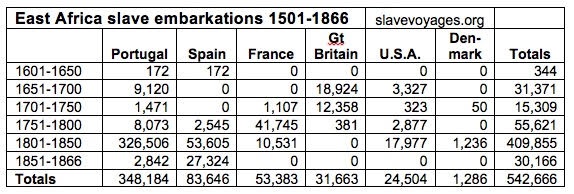
The Mozambican slave trade reached its peak in the 1820s and 1830s. The highest year was 1839, in which 31,756 slaves were taken from East Africa, most from Mozambique. Two-thirds were taken by Portuguese slavers and the rest by Spanish slavers. Mozambique’s population at the time was 8.4 mn. The slave trade was so serious that it depopulated what is now Niassa and forced the Makonde to flee to the Mueda plateau.
- Covid-19 cases and deaths high but decreasing
The last week of July saw a record 13,268 Covid-19 cases and 180 deaths. The first week of August saw a significant drop, to 9771 cases and 148 deaths. The total toll of recorded deaths is 1618, but the number is probably much larger, especially outside Maputo where many people are not tested and deaths will be blamed on HIV or malaria.
In an interview with Savana (6 Aug) Ilesh Jani, director-general of the National Health Institute (INS) said that the much more rapid increase in the current third wave was typical of the Delta variant and that the restrictions imposed appeared to be working and lowering transmission, leading to a fall in new cases in two to three weeks.
President Filipe Nyusi said last week (3 Aug) that imposing more restrictions in the fight against Covid-19 would further retard the country’s development, and called for greater compliance with preventative measures already in force. The main cities are under mandatory curfew, with commerce, restaurants and services only operating for limited hours. (Lusa 4 Aug) But on 4 August Nyusi stressed the severity of the third wave, which has killed artists, sportspeople, workers, doctors, teachers, businesspeople and others, he said. (AIM 4 Aug)
Miguel de Brito’s weekly charts to Saturday 7 August show the peak:
New Covid-19 cases per week
Covid-19 deaths per week

The vaccination initiative of Mozambican private companies, Univax, has given 72,491 people their first dose of the vaccine and 13,401 their second dose. (Univax 9 Aug). 319 companies are supporting Univax to vaccinate their workers and their families. On 30 June they imported 500,000 doses of the VeroCell vaccine, made by the Chinese pharmaceutical company Sinopharm. Under an agreement with the Ministry of Health, Univax donated 139,590 doses to the government to vaccinate the vulnerable population as part of the national vaccination campaign.
Last weekend, 37,500 drivers and bus conductor were vaccinated. (O Pais 9 Aug)
President Nyusi said that in the initial stages of vaccination that began in February, only 400,000 Mozambicans have been fully immunised which is about 2.4% of the eligible population. Nyusi was launching a two-week mass vaccination drive, aiming to vaccinate 155,816 people over the age of 50, including teachers and civil servants who were not vaccinated in earlier round. (AIM 4 Aug) The vaccines are a mix of those manufactured by Sinopharm (1.5 mn does received in the past three weeks), AstraZeneca (manufactured in India under the name Covishield), and Johnson & Johnson.
On 26 July Mozambique received a donation of 302,400 doses of the Johnson & Johnson vaccine from the United States government, which requires only one dose per person. A trial is planned in Beira and Maputo of giving one dose each of the Sinopharm and AstraZenica vaccines.
Half of Mozambique’s children are chronically malnourished and this has not changed in two decades, said first lady Isaura Nyusi. (O Pais 9 Aug)
By Joseph Hanlon



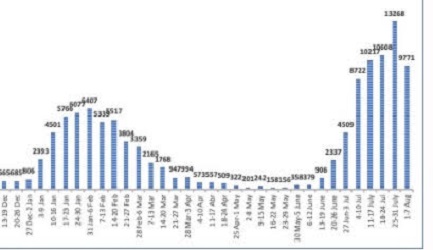
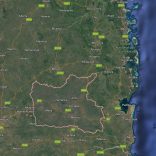

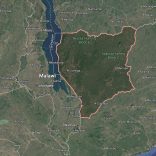
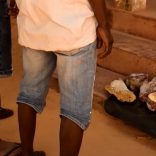






Leave a Reply
Be the First to Comment!
You must be logged in to post a comment.
You must be logged in to post a comment.